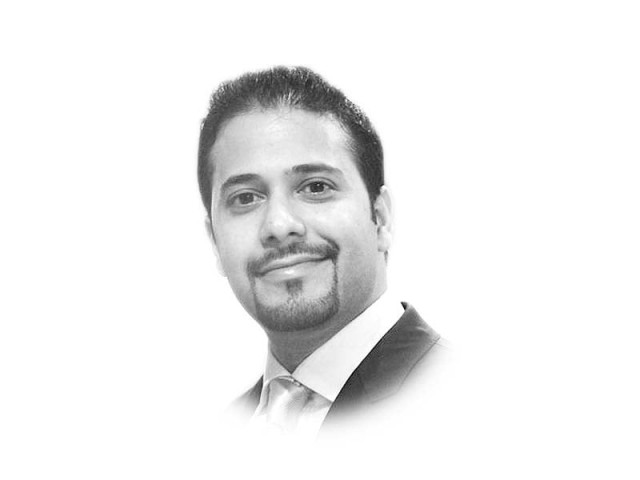It’s more us than Imran
The question, then, arises: if not Khan, then who? After all, ours is not the preserve of Roosevelts and Jeffersons

The writer is a freelance contributor based in New Jersey
But these words may well have come out of Sharif’s mouth, absent, of course, all grace and charm, given how fully they map onto our situation today. Much like America in 2008, Pakistan today looks to someone like Obama to deliver the country from this fever dream of loot and waste. Someone who could offer Pakistanis ‘change they can believe in’. Obama’s words, though, carry far greater exigency for us because we, unlike America, are a Third World problem, well on course to becoming a global tragedy.
So, in the absence of any real heroes, we often do what the human brain does best: we invent them. The human brain, as we know, has a remarkable capacity to converge fantasies upon banalities with results that look something like Imran Khan. To be clear, Khan as a celebrated former athlete and active philanthropist is, indeed, a hero. But Khan, the politician — a man who hitherto his PTI chairmanship had just about as much experience leading a political enterprise as Kim Kardashian operating the Hadron Collider — is a different individual altogether. Unlike his sparkling cricketing career, Khan’s political career is, at large, a wasteland of dramatic political vacillations, Red Zone violations, bizarre alliances, unending dharnas and parliament walk-outs. And now, the recent Judicial Commission findings which have denied all his allegations of systemic rigging in the 2013 elections reveal something that could be at the heart of Khan’s politics: agitation without premeditation.

A cursory view of Khan’s political history, then, is to witness political agitation and opposition in its most meandering perpetuity. His approach may be legitimate, agitation being a necessary weapon in the face of an impermeable status quo. But the distinction between fitful agitation and a focused one remains fuzzy in Khan’s political calculus. But then, such are the ways of a man made impatient by the cattle-prod of his ambition, who views himself less a politician and more a Malcom X-type revolutionary.
There is yet another factor which makes Khan a character, at once celebrated and vilified, with equal passion. For it is he, who in a single personage embodies all that is polarising and contentious between Pakistan’s liberal left and the conservative right. Conservatives still struggle to get over his dapper days of youth, the risque Oxford ‘playboy’ persona that just doesn’t mesh with the crude, normative hush-hush lechery of our traditional politicians, let alone the envy it must evoke in the tortured imaginations of men in equal parts deprived and depraved. The liberals, in contrast, begrudge him for pandering to conservative circles. In this, Khan’s muteness on controversial Zia-era laws; his infamous resistance to the Women’s Protection Bill; and his refusal to draw a line between the Afghan Taliban and murderers like the TTP, among other travesties, makes for a dispiriting prelude to coming attractions, if indeed he ever becomes prime minister.
The question, then, arises: if not Khan, then who? After all, ours is not the preserve of Roosevelts and Jeffersons, rather we are home to the marshy haunts of khakis and waist-coats; of beards and Kalashnikovs, of twirled moustaches and whispered secrets. But this paradox could play to our strength. As it happens, our condition is tragically simple. All we need at the helm is an honest man, as rudimentary and unglamorous as that sounds. Someone who will not thrive in financial kickbacks, or perpetuate some crooked dynasty, or exercise his dual citizenship in diabolical cycles of exiles and returns. Someone with no prior charges of corruption or murder either. This is setting the bar low, but not low enough to have stopped certain people from occupying the throne in the past.
Who then but Khan fits the bill?
His frothing critics don’t agree. “He needs to pay more attention to K-P!” they say. But what about K-P? That it beats other provinces in highest public satisfaction? That the K-P government is recruiting teachers en masse and fixing broken schools? That it’s finally addressing the blood-feasting patwari system of old, depoliticising the police and launching online FIR systems — the first of its kind? And what about the PTI’s initiative to build 300-plus micro hydel dams and planting millions of trees? All this, by the way, among a slew of other initiatives far too many to list here. And this may send a few scrambling for Prozac, but K-P has re-voted for the PTI in the local government elections.
But accusations are nothing new for Imran. Declared scion of the Illuminati by some when he first ascended to prominence to then be later accused of the opposite, i.e., courting the Taliban, no one taps the creative genius of our schizoid quarters better than Khan.
In the final analysis, one may concede that along the gradient of political maturity, Khan hovers near the lower margins, his record a tale of unilateral indiscretions, intra-party schisms and terrible alliances. But one can equally recognise that far worse infractions have been committed by those who continue to enjoy heavy mandates in our present polity. Yet, the worst of scorn is typically reserved for Khan. This may say something about Khan, but it says a lot more about the people he wants to lead.
Published in The Express Tribune, August 2nd, 2015.
Like Opinion & Editorial on Facebook, follow @ETOpEd on Twitter to receive all updates on all our daily pieces.
















COMMENTS
Comments are moderated and generally will be posted if they are on-topic and not abusive.
For more information, please see our Comments FAQ